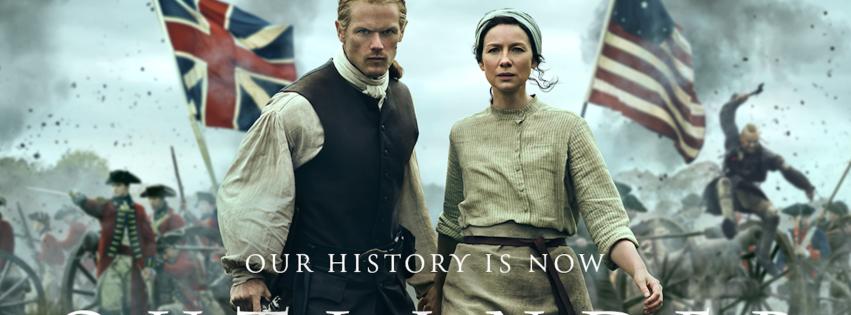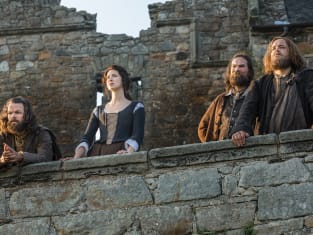Outlander Showrunner Previews Season 2, Explains Jamie/Randall Relationship
Jim Halterman at . Updated at .It's okay if you haven't quite gotten over Outlander Season 1 Episode 16.
In fact, it may take some time to get beyond the intense flashback scenes that showed just how sadistic Black Jack Randall could be with Jamie Fraser in his clutches.
And it may take some time before Jamie and Claire are back in a good place ... but at least the season ended with a feeling of hope as they embarked on their next adventure in France.
You probably had a lot of questions after watching the Outlander Season 1 finale, so I had the good fortune of speaking with showrunner/executive producer Ron Moore about everything we saw, what it all means and how will it impact our favorite characters moving forward.
TV Fanatic: I remember talking last year at Comic Con and asked about Randall’s sexuality and you had said he was a bisexual sadist. Do you still feel that way now that you’ve filmed that part of the story?
Ron Moore: I think I gave you that answer from Diana. That’s the way she’s described him so I defaulted to that. I never thought too deeply about it beyond that. Black Jack Randall serially attacks women and men so it sort of fits the definition of bisexuality in that sense but it seems like he’s more interested in power and predatory behavior than I think in terms of his own sexuality. I don’t know if Jack has demonstrated a capacity to have any kind of sexual relationship with a man or a woman that doesn’t involve some kind of threat, pain or power gains of one or the other.
TVF: Earlier, in the Lollybroch episode, he can’t get it up when he’s about to attack Jamie’s sister so that made me wonder if that was about sexuality or not?
RM: It seemed that it wasn’t really about sexuality. Again, it felt like it was more about the fact that she wasn’t behaving in a way that could arouse his because his prey demonstrates fear, torment and pain would arouse him…I think it’s more about that than his desire for a female form or male form.
TVF: I could not remember another time when a series has tackled male rape with the male romantic lead. To me, it felt like something we hadn’t seen before.
RM: Yeah, I felt the same way. When I first read the book I thought ‘Wow, I don’t think I’ve never really seen this.’ The first time I read it was in consideration of making the TV series…I recalled not remembering having seen a show, certainly, that this is where you take your male lead character. I thought that was interesting in and of itself and sort of a challenge and I was attracted to doing the story because you go in a direction that you don’t normally take characters. And the audience hasn’t seen it so that’s always interesting so you can take the audience some place they haven’t been.
So once we decided to do it it was new ground and it’s not like people had done this before or thought about it or there had been conversations about it so we knew we were in different territory, which was exciting. I thought ‘alright, let’s try to tell the story as truthfully as we can. Let’s face it and not shy away from it. Let’s figure out where the lines are where it becomes gratuitous and the other line where it becomes too corny. Let’s just try to tackle it and take the characters as we set them up.’ We broke down the scenes and I gave extra rehearsal time to the actors and director to work through all the sequences with Jack and Jamie in the last two episodes. I spent a lot of time talking with them with Ira Steven Behr, who co-wrote the episodes. It was a lot of work and thought.
TVF: Do you think in terms of what we see in the episode, do you think Randall knows how he’s going to break Jamie or is he kind of making it up as he goes along?
RM: I think he walks in there with a plan. It seems like he’s a character has an idea of what he wanted and every step he was willing to stop. He stopped Jamie’s execution to get there. There’s even a moment where he has Jamie helpless and he starts to bring himself to climax with Jamie and he stops himself and says ‘No, I won’t let my own coarse passion take over.’ So he’s definitely willing to stop himself at his own instinct because he hasn’t quite fulfilled his vision. I think he does have a plan and I’m sure it changed in the course of the scene based on what Jamie said and how he reacted but he comes in the room ready with a contract and saying ‘I’ll do this if you’ll do that.’
TVF: Also in the episode, Claire divulges everything to the priest but why is that important for her to tell him everything at this point in time even knowing what it could cost her?
RM: Well, that was also drawn from the book and I think it serves at the idea of just being able for her to unburden herself for everything that she’s done. She felt very responsible and very guilty over the whole situation. Jamie wouldn’t have ended up where he was and several people whose lives were hindered because Claire had come to this world and I think at this point in the story she needed to touch base spiritually with her faith…it still was a place she went back to in a moment of crisis where she just needed to get guidance from God.
TVF: Do you think there are some people who might jump to the conclusion that Jamie could be gay? He does climax with Randall even though there’s this psychological game played on him? I feel like he justifies it by saying he felt some pleasure after so much pain but did you and your writers talk about that at all?
RM: We didn’t think about it too deeply. We kept setting aside what people’s reactions were going to be whenever they came up. We sort of avoided any of the ‘What is the socio-political aspect of what this is saying about homosexuality, heterosexuality or bisexuality?’ We tried to keep that out of the room because we were just trying to tell some stories. I think with this episode, some people will jump to that conclusion and there will be a lot of debate, I’m sure, about Randall’s sexuality and Jamie’s sexuality. That’s all fair game at this point but I don’t think the show is making a determinant statement one way or another. We’re just saying here are these characters and this is what happened in these circumstances. I’ll be curious what the audience takes away from it.
TVF: Moving forward into the second season, how much does this experience stay with Jamie? Does it haunt him or does he put it behind him?
RM: It definitely will reverberate into the second season and beyond. It’s not the dominant theme in the second season but we follow it up and it definitely affects him and it affects his relationship with Claire. Going forward into the rest of the book series, Diana never let him lose this experience…there are moments where Jamie reflects back on this. It’s a life altering event and definitely something that can ever really be taken away.
TVF: I know you’ve been watching Caitriona, Sam and Tobias this whole season but when you saw their work in these last episodes, what went through your head about their skill as actors?
RM: I was really proud of them. They were all just very fearless, which is the word I kept using. They were brave and they were willing to put themselves in vulnerable places. It also helped that there was a tremendous amount of trust between the three of them and you could see it as they worked together on stage. They were generous with each other and supported each other. I was very proud of the cast. They were just great and I was very proud of Sam as the dynamic in the center of it. He’s the man who all these things are happening to and he’s the one going through the biggest transformation. I thought he really stepped up and really holds you through all those scenes.
And Caitriona…I could sing Caitriona’s praises for hours and then Tobias, who gave this tremendous performance. I think the thing I admired most about what he did with Black Jack Randall is that he never lost contact with the fact that this is a man, a human being. He’s not a black and white monster. He’s a person, which makes it all the more terrifying. He’s not something out of the CG world. He’s a man who’s doing this to another man and you can see in Tobias’s performance that he actually is still there.
TVF: You’ve had several different directors throughout this first season but was there a benefit to having a female director (Anna Foerster) for these last episodes given the subject matter?
RM: It was a consideration. It wasn’t a central one but I definitely thought about it. Anna previously had done ‘The Wedding’ episode and she had built such a strong rapport with the cast and I was looking for someone who really had already established a strong bond with the cast so that there would be a fundamental trust going into these episodes. And then I thought, ‘Well, interesting if she’s a woman and then again with these two male actors and that there would be different energy in the scenes and the way they rehearsed and talked about it than if it were a man and it were three men talking about the subject matter and these difficult things and I thought this might be an interesting way in how to change the dynamic and introduce a different mood. I think it did turn out to be a really good choice both for her experience with the cast and the fact that it was a woman and it wasn’t another man. I think it changed it in subtle ways.
TVF: Now that this first season is behind you and you’re deep into making the second season, what was the biggest thing you learned about telling this story or what as the most challenging?
RM: It’s a big production to get your arms around. It’s a very complicated show and I’ve talked before about the fact that are there are no standing sets and how hard that is and we’re facing that again in the second season. It’s really, really complicates making television when you don’t have a home base to go back to. It wildly affects your shooting, your preparation, your budget and all that. The first season was hard…it’s just a daunting challenge. You never quite get comfortable with this show. You don’t say, “oh, we’re doing one of these shows again this week.” Every day and every week it’s just a completely new set of challenges and problems. On one hand it’s fresh and fun and interesting but on the other hand it’s very tiring.
Jim Halterman is the West Coast Editor of TV Fanatic and the owner of JimHalterman.com. Follow him on Twitter.







